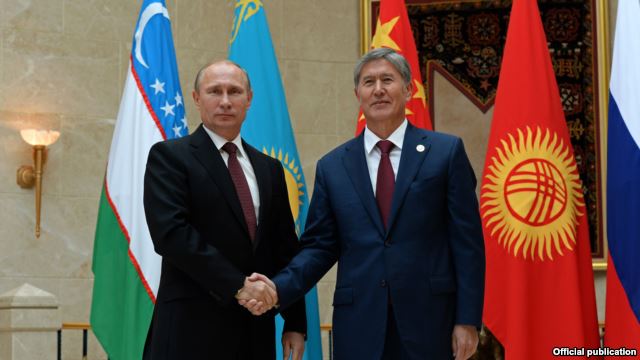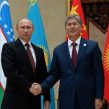
Eurasian Union’s Expansion Falters Amid Russia’s Economic Woes
Publication: Eurasia Daily Monitor Volume: 13 Issue: 42
By:

In a recent interview with the media, Kyrgyzstan’s Deputy Prime Minister Oleg Pankratov, whose portfolio includes overseeing the country’s membership in the Eurasian Economic Union (EEU), reported that the Kyrgyz Republic’s accession (as of August 12, 2015) to this Russian-led trading bloc has so far produced mixed results. According to him, the economic crisis in Russia and Kazakhstan has spread to other EEU member countries, including Kyrgyzstan. Furthermore, Kyrgyzstan, along with other regional states, experienced a sharp fall in remittances from its migrant workers in Russia (24.kg, February 3).
Notably, despite all the trade-facilitating measures that came into force with the launch of the Eurasian Union, on January 1, 2015, Kyrgyzstan’s trade turnover with other EEU members actually decreased in 2015 compared to previous years. For instance, total trade turnover between Kyrgyzstan and Kazakhstan dropped by half. Similarly Kyrgyzstan’s trade with Russia also experienced a significant decrease last year (Azattyk.kg, January 7). One reason for this reduction in trade was the devaluation of the national currencies in Kazakhstan and Russia. Second, after Kyrgyzstan joined the EEU, it was forced to stop the re-export of Chinese goods to other EEU members (Spk.kg, January 12).
Moreover, according to Talantbek Metkerim Uulu, the chairman of the Chamber of Commerce and Industry of Kyrgyzstan, his country’s trade with Turkey and Ukraine is greatly suffering because of Russia’s conflicts with these countries. Both Turkey and Ukraine were among Kyrgyzstan’s leading trading partners before it joined the EEU (24.kg, February 25).
The expansion of the Eurasian Economic Union by including as many post-Soviet countries as possible and as quickly as possible is one of the main geopolitical objectives of the current Russian government. Some suspect it is part of President Vladimir Putin’s grand design to recreate the former Soviet Union in one form or another (Putin-today.ru, September 16, 2015).
Thus when the decision was made on the accession of Kyrgyzstan and Armenia, only Russia showed real enthusiasm, while the other two founding members—Kazakhstan and Belarus—were more cautious. Indeed, these economically backward prospective members had little to offer the bloc. Yet, they expected substantial economic assistance from the existing member states in order to compensate them for any possible initial economic losses that resulted from joining (Aif.ru, May 7, 2015).
Eventually Kazakhstan and Belarus had to give in, but only after Russia agreed to bear the lion’s share of the so-called “accession costs” linked to Kyrgyzstan’s and Armenia’s need to upgrade their customs infrastructure (lragir.am, November 26, 2014).
Within this program of Russian assistance, Kyrgyzstan received $200 million to upgrade its customs infrastructure. Additionally, Moscow promised to allocate $1 billion to the newly created Russian-Kyrgyz Development Fund (RKDF) to support business activity in Kyrgyzstan and to compensate for the various economic losses that Kyrgyzstan would incur as a result of its accession to the EEU. So far the RKDF has received only $350 million of the promised funds (Rkdf.org, December 29, 2015).
Seeing trade and overall business activity drop in the country after its accession to the EEU, Kyrgyzstan’s President Almazbek Atambaev vented his frustration on the RKDF by expressing dissatisfaction with its work (Vb.kg, December 24, 2015). Meanwhile, Kyrgyz businessmen complain that the RKDF over-bureaucratizes loan applications and keeps its funds in Russian banks out of a fear of embezzlement and misuse by local banks linked to powerful political and business groups. All of this slows down the RKDF’s issuing of credits (Politmer.kg, February 12). Furthermore, Kyrgyzstani business circles believe that the $1 billion pledged to the RKDF will only be a drop in the ocean and definitely not the game changer that Kyrgyzstan needs to modernize its economy and boost exports (Kabarlar.org, November 28, 2015).
Nonetheless, despite these various difficulties and his own mixed assessments on the subject, Deputy Prime Minister Pankratov and other senior officials in the Kyrgyz Republic believe that joining the EEU was the correct decision. According to them, the negative consequences from not joining the EEU would have been far greater than with Kyrgyzstan inside the regional bloc (Kabar.kg, January 29).
Apparently, it is also true that EEU membership failed to make Kyrgyzstan’s various economic challenges any easier to cope with. If anything, it just underlined this small country’s heavy reliance on Russia. As for Russia, which is itself experiencing a serious economic crisis, it will probably become increasingly more difficult to find the funds necessary to continue to bankroll President Putin’s foreign policy ambitions or commitments (Gezitter.org, January 26).
After Kyrgyzstan’s accession, the EEU now has a common border with Tajikistan, the absence of which was previously cited by officials in Dushanbe as the main barrier preventing their country from immediately joining the bloc. However, a cost-weary Kremlin might no longer press so hard on Tajikistan to join the EEU in the near term, thus allowing Dushanbe the liberty to take as much time as necessary to thoroughly study and assess all the potential advantages and disadvantages of membership (Rosbalt.ru, May 14, 2015).
Even pro-Russian Tajik groups believe that Tajikistan’s government should prepare a strong opening negotiating position before launching accession talks. Abdullo Habibov, the chairman of the Eurasian Development Club—a pro-Russian lobbyist organization—believes that for Tajikistan to join the EEU, Russia will need to help the country implement a new domestic industrialization program. The establishment of a joint development fund similar to the RKDF should be a necessary precondition for this, he argues. Besides that, import-dependent Tajikistan hopes that Russia will compensate it for all expected customs revenue losses in order to smooth over the needed structural readjustments to the Tajikistani economy (News.tj, July 28, 2015).
Decreasing trade among the EEU’s members, coupled and in large part driven by Russia’s own deep recession and trade wars with the European Union, Turkey and Ukraine, is seriously undermining the appeal of the trading bloc. Nevertheless, the Kremlin might still try to persist in its policy of further expanding the Eurasian Union. But with limited funds, it will only be able to do so by increasingly resorting to hard tactics to compel new members, including Tajikistan, to join. The more than one million Tajikistani migrant laborers who work in Russia as well as the promise of duty-free petroleum deliveries could become two powerful levers against Dushanbe, if it tries to resist Moscow’s will. But then this would simply further underscore that the EEU is not a voluntary union of the willing, as Russia would like the international community to perceive it, but rather “a prison of nations,” as was the case with the former Soviet Union.




